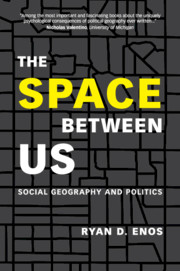Book contents
- Frontmatter
- Dedication
- Contents
- List of Figures
- Preface
- Acknowledgments
- 1 The Red Line
- 2 The Demagogue of Space
- 3 The Demagogue's Mechanism: Groups, Space, and the Mind
- 4 Laboratories: Assigning Space
- 5 Boston: Trains, Immigrants, and the Arizona Question
- 6 Chicago: Projects and a Shock to Social Geography
- 7 Jerusalem: Walls and the Problem of Cooperation
- 8 Crenshaw Boulevard, Los Angeles: Contact and Exit
- 9 Phoenix: The Arc of Intergroup Interactions and the Political Future
- Notes
- Bibliography
- Index
7 - Jerusalem: Walls and the Problem of Cooperation
Published online by Cambridge University Press: 25 October 2017
- Frontmatter
- Dedication
- Contents
- List of Figures
- Preface
- Acknowledgments
- 1 The Red Line
- 2 The Demagogue of Space
- 3 The Demagogue's Mechanism: Groups, Space, and the Mind
- 4 Laboratories: Assigning Space
- 5 Boston: Trains, Immigrants, and the Arizona Question
- 6 Chicago: Projects and a Shock to Social Geography
- 7 Jerusalem: Walls and the Problem of Cooperation
- 8 Crenshaw Boulevard, Los Angeles: Contact and Exit
- 9 Phoenix: The Arc of Intergroup Interactions and the Political Future
- Notes
- Bibliography
- Index
Summary
What makes it possible for cooperation to emerge is the fact that the players might meet again.
– Robert AxelrodIn the summer of 2013, I stared out the window of a fourth-floor apartment in Neve Yaakov, a Jewish neighborhood in Jerusalem. Looking deep into East Jerusalem, in an area much of the world considers occupied Palestinian land, I could see the gray slabs of the snaking concrete wall erected by the Israeli government to separate Israel from the West Bank. At the kitchen table across the room sat an Israeli woman, an immigrant from Kazakhstan, working at a computer while her infant slept close by in a crib.
This particular view of the wall – called the “separation barrier,” “security fence,” or “apartheid wall,” depending on who is speaking – stuck vividly in my memory because it seemed so appropriate, given the reason that I found myself in this woman's home. On the laptop my colleagues and I had provided for her, she was deciding whether or not to share money with an Arab and another Jew, who had also been given money and asked to share it with her. She was playing a “Prisoner's Dilemma” game, the classic game of cooperation designed to measure trust. Scholars argue that it captures the dynamics of trust necessary for the collective action which, in turn, is necessary for societies to function successfully. I had come to Israel to collect data from subjects like this woman in order to understand how social geography, the space between us created by walls and governments, affects our ability to cooperate – to solve the dilemmas of collective action represented by this game.
Out the window, I could see one of the starkest examples of man-made segregation you will find. This was what I had come to Israel to understand: when people segregate themselves, often intentionally, can a society still function well? Can a segregated society reach the levels of cooperation necessary to care for the young, old, and sick and provide for the common welfare? Or does social geography – the mighty demagogue – stop us from doing these things?
I had been to Israel before. In late summer 2011, I found myself on a hilltop in an olive orchard outside the town of Bir Zayt in the Occupied West Bank.
- Type
- Chapter
- Information
- The Space between UsSocial Geography and Politics, pp. 171 - 196Publisher: Cambridge University PressPrint publication year: 2017



